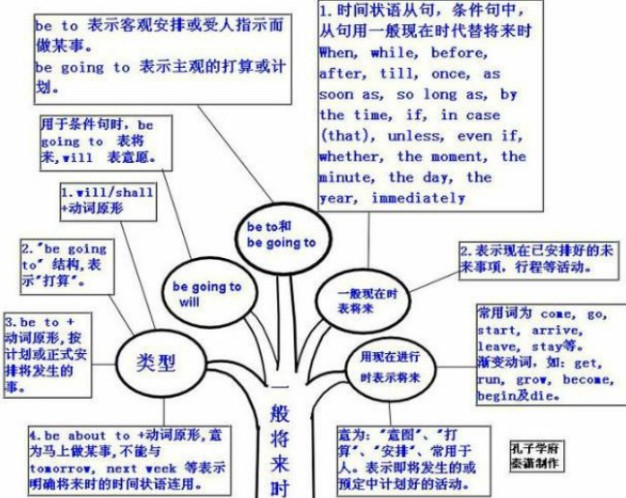本试题 “I don't know ______ tomorrow. Can you tell me?A. when we startedB. when did we startC. when we will startD. when will we start” 主要考查您对一般将来时
宾语从句
等考点的理解。关于这些考点您可以点击下面的选项卡查看详细档案。
- 一般将来时
- 宾语从句
一般将来时的概念:
一般将来时表示将来某一时刻的发生动作或状态,或将来某一段时间内经常的动作或状态。常与表示将来的时间状语连用。
一般将来时用法:
1)shall用于第一人称,常被will所代替。will在陈述句中用于各人称,在征求意见时常用于第二人称。
例如:Which paragraph shall I read first?我先读哪一段呢?
Will you be at home at seven this evening? 今晚七点回家好吗?
2)be going to+不定式,表示将来。
a. 主语的意图,即将做某事。
例如:What are you going to do tomorrow? 明天打算作什么呢?
b. 计划,安排要发生的事。
例如:The play is going to be produced next month。这出戏下月开播。
c. 有迹象要发生的事。
例如:Look at the dark clouds, there is going to be a storm. 看那乌云,快要下雨了。
3)be+不定式表将来,按计划或正式安排将发生的事。
例如:We are to discuss the report next Saturday. 我们下星期六讨论这份报告。
4)be about to+不定式,意为马上做某事。
例如:He is about to leave for Beijing. 他马上要去北京。
注意:be about to do不能与tomorrow, next week 等表示明确将来时的时间状语连用。
一般将来时知识体系:

一般现在时表将来:
1)下列动词come, go, arrive, leave, start, begin, return的一般现在时可以表示将来,主要用来表示在时间上已确定或安排好的事情。
例如:The train leaves a tsix tomorrow morning. 火车明天上午六点开。
—When does the bus star? 汽车什么时候开?
—It stars in ten minutes. ?十分钟后。
2)以here, there等开始的倒装句,表示动作正在进行。
例如:Here comes the bus.=The bus is coming. 车来了。
There goes the bell.=The bell is ringing. 铃响了。
3)在时间或条件句中。
例如:When Bill comes(不是will come), ask him to wait for me. 比尔来后,让他等我。
I'll write to you as soon as I arrive there. 我到了那里,就写信给你。
4)在动词hope, take carethat,makesurethat等的宾语从句中。
例如:I hope they have a nice time next week. 我希望他们下星期玩得开心。
Make sure that the windows are closed before you leave the room. 离开房间前,务必把窗户关了。
现在进行时表示将来:
下列动词come, go, arrive, leave, start, begin, return等现在进行时可以表示将来。
例如:I'm leaving tomorrow. 明天我要走了。
Are you staying here till next week? 你会在这儿呆到下周吗?
宾语从句的概念:
置于动词、介词等词性后面起宾语作用的从句叫宾语从句。宾语从句的语序必须是陈述语序。谓语动词、介词、动词不定式,v.-ing形式后面都能带宾语从句。有些形容词(afraid, sure, glad等)之后也可以带宾语从句。
宾语从句的用法:
1、宾语从句的引导词:
宾语从句通常由连词that和whether(if)、连接代词或连接副词以及关系代词型what引导:
如:We believe that he is honest. 我们相信他是诚实的。
I don't know whether he'll arrive in time. 我不知道他是否能及时到。
I don't know who(m) you mean. 我不知道你指谁。
He asked why he had to go alone. 他问他为什么必须一个人去。
Please tell me which you like. 告诉我你喜欢哪一个。
She has got what she wanted. 她要的东西得到了。
注:有时介词后可接跟一个宾语从句(但介词后通常不接that和if引导的宾语从句):
如:From what you say, he is right. 根据你所说的,他是对的。
有极个别介词(如but,except)可接that引导的宾语从句:
如:She remembered nothing about him except that his hair was black. 她对他什么都不记得,只记得他的头发是黑的。
2、宾语从句与形式宾语it:
当宾语从句后跟有宾语补足语时,通常在宾语从句处使用形式宾语it,而将真正的宾语从句移至句末:
如:I think it best that you should stay here. 我认为你最好住这儿。
He hasn't made it known when he is going to get married. 他还没宣布他何时结婚。
3、连词that的省略问题:
引导宾语从句的连词that通常可以省略:
如:She said(that) she would come to the meeting. 她说过要来开会的。
I promise you(that) I will be there. 我答应你我会去。
注:有时为了强调,that引导的宾语从句可位于句首,此时that不可省略:
如:That she is a good girl I know. 她是一个好姑娘,我是知道的。
4、宾语从句与否定转移当动词think, believe, suppose, expect, imagine后接一个表示否定意义的宾语从句时,其否定通常转移到主语:
如:I don't suppose that it is true. 我认为那不是真的。
I don't imagine that he will come. 我想他不会
使用宾语从句特别注意:
一、宾语从句的语序:
宾语从句的语序是陈述句语序即:连接代词/副词+主语+谓语+其他成分。
如:I don't know what they are looking for.
Could you tell me when the train will leave?
Can you imagine what kind of man he is?
二、宾语从句的时态:
主句是一般现在时,从句根据实际情况使用任何时态。
句:The headmaster hopes everything goes well.
主句是过去时态,从句须用过去时态的某种形式。
句:She was sorry that she hadn't finished her work on time.
当宾语从句表示的是一个客观真理或者事实时,即使主句是过去时,从句也用一般现在时态。
如:The teacher told his class that light travels faster than sound.
三、宾语从句的特点:
宾语从句可以作及物动词、介词及形容词的宾语。宾语从句的语序一律用陈述句语序。连接词that引导宾语从句在句中无词义,不充当句子成份,多数情况下可以省略。whether和if都可引导宾语从句,但whether后可紧跟or not;whether从句可作介词的宾语。如果从句太长,可以用形式宾语it.
与“I don't know ______ tomorrow. Can you tell me?A. when we ...”考查相似的试题有:
- 短文改错。英浯课上,老师要求同桌同学相互修改作文。假设以下小短文为你同桌所写,请你对其进行修改。短文中共有10处错误,...
- Police have found________appears to be the lost ancient statue.A.whichB.whereC.howD.what
- I asked my lawyer ___ say in court .[ ]A. what I shouldB. what should IC. how I shouldD. how should I
- The job required ________did it ________careful and brave enough.[ ]A. who; isB. whom; wasC. whomever; wereD. whoever...
- Now that their parents are dead, the poor boy doesn't know ________ the money they left.[ ]A. how to do withB. what t...
- Jenny has got _______ it takes to be a good actress. In other words, she has the potential to become famous.A.whenB...
- Tom insisted what he said ______ true, but we insisted that he _____ and have a look.A.be, should goB.should be, wo...
- It surprised us all ______ Kate made such big progress in this final exam.A.whenB.thatC.howD.whether
- Do you believe __ true ___ you find high wages, you generally find high prices?A.that; thatB.that; that whatC.it; ...
- ---Can you tell me _______?---With Lucy’s help.A.when you did it so wellB.when did you do it so wellC.how you did ...